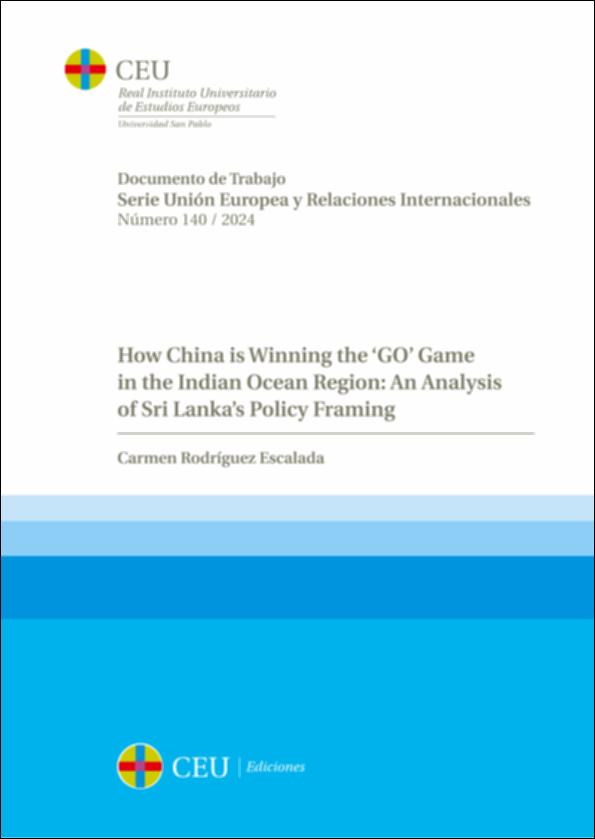Por favor, use este identificador para citar o enlazar este ítem:
http://hdl.handle.net/10637/15938How China is Winning the ‘GO’ Game in the Indian Ocean Region: An Analysis of Sri Lanka’s Policy Framing
| Título : | How China is Winning the ‘GO’ Game in the Indian Ocean Region: An Analysis of Sri Lanka’s Policy Framing |
| Otros títulos: | Documento de Trabajo (Universidad San Pablo-CEU, Real Instituto de Estudios Europeos). Serie Unión Europea y Relaciones Internacionales: 140/2024 |
| Autor : | Rodríguez Escalada, Carmen |
| Materias: | Iniciativa de la Franja y la Ruta; Collar de Perlas; China; Wéiqí; Sri Lanka; India; Estrategia del cercamiento; Poder duro; Geoestrategia; Collar de Diamantes; Belt and Road Initiative; String of Pearls; Encirclement; Hard power; Geostrategy; Necklace of Diamonds |
| Editorial : | Madrid : CEU Ediciones, 2024 |
| Citación : | Rodríguez-Escalada, Carmen (2024) How China is Winning the ‘GO’ Game in the Indian Ocean Region: An Analysis of Sri Lanka’s Policy Framing. Serie Unión Europea y Relaciones Internacionales. CEU Ediciones |
| Resumen : | The game of “GO” is a complex and strategic game invented around 40 centuries ago in which its main goal is to surround more territory on the board than your opponent. References to this game can be found in Chinese texts as early as 2,500 years ago. Indeed, it left a notable footprint in Chinese culture, so much so that the game was considered one of the four essential arts of a cultured Chinese scholar, along with music, calligraphy, and painting. However, the GO game goes beyond the world of the arts and expands itself to real-world practical strategic importance. This becomes evident when observing China’s wéiqí-like strategy behind the Maritime Silk Road Initiative, which is part of China’s larger Belt and Road Initiative (BRI), which aims at connecting over 100 nations into a mega-trade network. Currently, the main area of concern for China’s Initiative is the Indian Ocean, as it holds its biggest economic and geopolitical weak point, namely the Strait of Malacca. Taking this into consideration, this paper examines the current position of China on the ‘wéiqí board,’ in other words, its geographical location, and its entailing strengths and weaknesses vis-àvis India, its primary opponent in the Indian Ocean Region. This understanding is crucial in determining China’s future economic and political game plan at a regional but also international level. El juego del “GO” es un juego estratégico complejo inventado hace unos 40 siglos. Su principal objetivo es rodear más territorio en el tablero que tu oponente. Se pueden encontrar referencias a este juego en textos chinos de hace 2.500 años. De hecho, dejó una huella notable en la cultura china, hasta el punto de que el juego se consideraba una de las cuatro artes esenciales de un erudito chino, junto con la música, la caligrafía y la pintura. Sin embargo, el juego GO va más allá del mundo de las artes y se expande al mundo internacional debido a su importancia geoestratégica. Esto se hace evidente al observar las similitudes en las estrategias del juego GO a las estrategias geopolíticas y geoeconómicas de China detrás de la Iniciativa de la Ruta Marítima de la Seda, que forma parte de la más amplia Iniciativa de la Franja y la Ruta (BRI, por sus siglas en inglés), cuyo objetivo es conectar a más de 100 naciones en una mega red comercial. Actualmente, la principal zona de interés para la Iniciativa de China es el Océano Índico, ya que alberga su mayor punto débil económico y geopolítico: el Estrecho de Malaca. Teniendo esto en cuenta, este documento analiza la posición actual de China en el “tablero wéiqí”, es decir, su situación geográfica, y los puntos fuertes y débiles que conlleva frente a India, su principal oponente en la región del Océano Índico. Esta comprensión es crucial para determinar el futuro plan económico y político de China a escala regional, pero también internacional. |
| URI : | http://hdl.handle.net/10637/15938 |
| Derechos: | http://creativecommons.org/licenses/by-nc-nd/4.0/deed.es |
| ISBN : | 978-84-19976-38-3 |
| Fecha de publicación : | 2024 |
| Centro : | Universidad San Pablo-CEU |
| Aparece en las colecciones: | Archivo Digital España - Unión Europea Real Instituto Universitario de Estudios Europeos (Universidad San Pablo-CEU) |
Los ítems de DSpace están protegidos por copyright, con todos los derechos reservados, a menos que se indique lo contrario.


